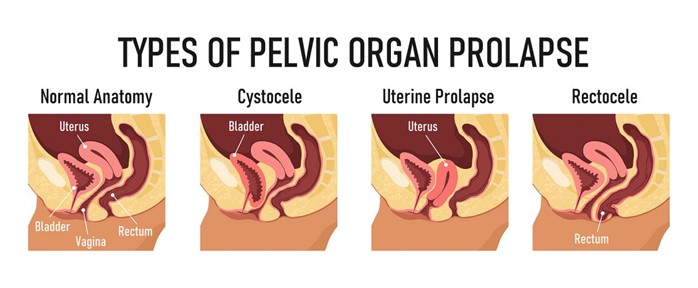A nurse is reading a journal article about the care of a woman with pelvic organ prolapse. The nurse would expect to find information related to which disorder? Select all that apply.
Fecal incontinence
Rectocele
Urinary incontinence
Cystocele
Enterocele
Correct Answer : B,C,D,E
Choice A: Fecal incontinence is not the correct answer because it is not a disorder of pelvic organ prolapse. Fecal incontinence is a condition that causes the loss of bowel control, resulting in involuntary leakage of stool or gas. It can be caused by various factors such as nerve damage, muscle weakness, or diarrhea. It is not related to the displacement or descent of pelvic organs.
Choice B: Rectocele is the correct answer because it is a disorder of pelvic organ prolapse. Rectocele is a condition that occurs when the rectum bulges or sags into the vagina, creating a pouch or hernia. It can cause symptoms such as constipation, difficulty with bowel movements, or a feeling of pressure or fullness in the vagina. It is caused by the weakening or stretching of the pelvic floor muscles and connective tissue that support the rectum and vagina.
Choice C: Urinary incontinence is the correct answer because it is a disorder of pelvic organ prolapse. Urinary incontinence is a condition that causes the loss of bladder control, resulting in involuntary leakage of urine or urge to urinate. It can be caused by various factors such as stress, infection, or medication. It is also related to the displacement or descent of pelvic organs, such as the bladder or urethra, which can affect the function and closure of the urinary sphincter.
Choice D: Cystocele is the correct answer because it is a disorder of pelvic organ prolapse. Cystocele is a condition that occurs when the bladder protrudes or drops into the vagina, creating a pouch or hernia. It can cause symptoms such as urinary frequency, urgency, or retention, or a feeling of pressure or fullness in the vagina. It is caused by the weakening or stretching of the pelvic floor muscles and connective tissue that support the bladder and vagina.
Choice E: Enterocele is the correct answer because it is a disorder of pelvic organ prolapse. Enterocele is a condition that occurs when the small intestine bulges or descends into the vagina, creating a pouch or hernia. It can cause symptoms such as lower back pain, pelvic pressure, or difficulty with bowel movements. It is caused by the weakening or stretching of the pelvic floor muscles and connective tissue that support the small intestine and vagina.

Nursing Test Bank
Naxlex Comprehensive Predictor Exams
Related Questions
Correct Answer is B
Explanation
Choice A: Cancer is not the correct answer because it is not the leading cause of death among women. According to the World Health Organization, cancer accounted for 15% of all deaths among women in 2019.
Choice B: Heart Disease is the correct answer because it is the leading cause of death among women worldwide. According to the World Health Organization, heart disease accounted for 21% of all deaths among women in 2019. Many women are unaware of the risk factors and symptoms of heart disease, and may not seek timely medical attention. Therefore, educational programs that raise awareness and promote the prevention of heart disease are a priority for women's health.
Choice C: Diabetes is not the correct answer because it is not the leading cause of death among women. According to the World Health Organization, diabetes accounted for 4% of all deaths among women in 2019. However, diabetes can increase the risk of developing other complications such as heart disease, kidney disease, and blindness. Therefore, educational programs that teach women how to manage their blood sugar levels and prevent complications are important for women's health.
Choice D: Smoking is not the correct answer because it is not a condition, but a risk factor for many diseases. Smoking can increase the risk of developing lung cancer, heart disease, stroke, and chronic obstructive pulmonary disease. Therefore, educational programs that help women quit smoking and avoid exposure to secondhand smoke are beneficial for women's health.

Correct Answer is ["0.8"]
Explanation
- To find the amount of mL to administer per dose, we need to use a ratio and proportion method.
- We can set up a proportion as follows: 250 mg/2 mL = 100 mg/x mL
- To solve for x, we cross-multiply and get: 250x = 200
- Then we divide both sides by 250 and get: x = 200/250
- To simplify, we can reduce the fraction by dividing both the numerator and denominator by 50 and get: x = 4/5
- To convert the fraction to a decimal, we divide 4 by 5 and get: x = 0.8
- Therefore, the nurse should administer 0.8 mL of hydrocortisone per dose.
Whether you are a student looking to ace your exams or a practicing nurse seeking to enhance your expertise , our nursing education contents will empower you with the confidence and competence to make a difference in the lives of patients and become a respected leader in the healthcare field.
Visit Naxlex, invest in your future and unlock endless possibilities with our unparalleled nursing education contents today
Report Wrong Answer on the Current Question
Do you disagree with the answer? If yes, what is your expected answer? Explain.
Kindly be descriptive with the issue you are facing.
